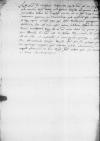List #2144
[Ioannes DANTISCUS] do [Paweł PŁOTOWSKI]Heilsberg (Lidzbark Warmiński), 1539-05-06
Regest polski:
Brat adresata [Mikołaj Płotowski] poinformował Dantyszka o treści listu otrzymanego od adresata.
Dantyszek zawiadamia, że wiele dni temu, w związku z panującą w Malborku zarazą, na prośbę panów pruskich wysłał do króla [Zygmunta I] list z prośbą, aby termin sejmu [pruskiego] został przełożony na okres po Pięćdziesiątnicy, a jego lokalizację mogli wyznaczyć członkowie Rady Pruskiej. Póki nie nadejdzie odpowiedź króla, nie ma potrzeby, by adresat przyjeżdżał w ustalonym wcześniej terminie.
Kiedy adresat przybędzie do Dantyszka, otrzyma od niego lekarstwo na podagrę.
Rękopiśmienne podstawy źródłowe:
Pomocnicze podstawy źródłowe:
Publikacje:
| ||||||||||
Tekst + aparat krytyczny + komentarz Zwykły tekst Tekst + komentarz Tekst + aparat krytyczny
Ea, quae Dominatio Vestra
Quod Dominatio Vestra pro sua podagra petit hidden by binding⌈[it]it hidden by binding⌉, hic apud me accipiet. Quam libenter videbo advenientique non negabo pharmacum Dominationi Vestrae.
Quam feliciter valere opto.

 AAWO, AB, D.6, f. 36v
AAWO, AB, D.6, f. 36v